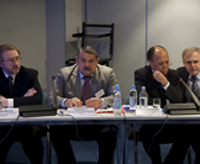
A consultation on the progress, gaps and next steps towards achieving universal access to HIV prevention in the Russian Federation took place in Moscow on 25-26 February.
Credit: UNAIDS
A consultation on the progress, gaps and next steps towards achieving universal access to HIV prevention in the Russian Federation took place in Moscow on 25-26 February. The meeting was convened by the Russian Ministry of Health and Social Development, the Federal Service for Surveillance on Consumer Rights Protection and Human Well-being, the Federal AIDS Centre and UNAIDS. Around 100 health care professionals took part in the conference including representatives of the All-Russia Association of People Living with HIV/AIDS, and members of civil society from 23 Russian regions.
Russia has made significant progress towards achieving their universal access to HIV prevention, treatment, care and support targets endorsed by the 2006 Political Declaration on HIV/AIDS. In 2008, 55,000 people received HIV treatment, and 24 million people were screened for HIV. This year for the first time ever 400 million roubles (about US$ 14 million) of federal budget were earmarked for HIV prevention, which is a doubling of the previous years’ budget.
"There are about 400 prevention projects carried out within the framework of the National Priority Health Project. However the HIV epidemic keeps on spreading. While progress has been made in HIV treatment, screening and prevention of mother-to-child transmission other HIV prevention interventions need improvement."
Alexander Goliusov, head of HIV/AIDS department of Federal Service for Surveillance on Consumer Rights Protection and Human Well-being
The number of new HIV infections in Russia has not reduced and accounts for almost 40,000 people a year. This is in spite of increased spending and widening coverage of HIV prevention programmes among populations at higher risk including people who inject drugs, sex workers, prisoners and men who have sex with men as well as young people and the general population. These numbers confirm the need to increase the coverage of key populations through establishing evidence-informed prevention methods and by ensuring the provision of quality services.
The meeting provided an opportunity to address the most urgent issues around HIV prevention in Russia. Participants analysed the need to identify weak components in the HIV prevention work and stepping up its efficiency by introducing specific measures. Alexander Goliusov, head of HIV/AIDS department of Federal Service for Surveillance on Consumer Rights Protection and Human Well-being, said:

L to R: Dr. Vadim Pokrovsky, Head of Federal AIDS Centre, Dr. Alexander Goliusov, Head of HIV/AIDS Department of Federal Service for Surveillance on Consumer Rights, Protection and Human Well-Being, Fritz Lherisson, a.i. Regional Director, Regional Support Group, Eastern Europe and Central Asia
Credit: UNAIDS
"There are about 400 prevention projects carried out within the framework of the National Priority Health Project. However the HIV epidemic keeps on spreading. While progress has been made in HIV treatment, screening and prevention of mother-to-child transmission other HIV prevention interventions need improvement.”
Currently 45% of all country’s HIV prevention efforts are aimed at most-at-risk populations and 55% of the projects focus on various kind of support for people living with HIV. Russia implements different successful innovative programmes. However the conference emphasized that most of the projects do not go beyond the stage of pilot efforts, thus the population exposed to HIV prevention measures remains insufficient. For example, the needs of young people are not adequately addressed by HIV prevention work. In 2007 only 33.8% of young people of aged 15-24 had correct understanding of HIV infection. The Russian government set the goal for 2010 at 95%.
“Russia has made substantial progress towards a number of universal access indicators, mainly in the field of HIV treatment. Regretfully, as it is in many other countries, achievements in widening HIV prevention programmes especially among most-at-risk populations and the youth are lagging behind the advances in treatment,” said Marina Semenchenko, acting team leader of the UNAIDS office in Russia. “At the meeting, Russian experts discussed various viewpoints of efficient and not efficient measures of HIV prevention, and what could be done to achieve tangible results in HIV prevention.”
The discussion also addressed the issue of introducing a sustainable HIV prevention programme in the secondary school education system. Currently, HIV information - the ways of transmission and prevention - is included in school subjects as Biology, and Health and Safety; however they do not provide an adequate and up-to-date understanding of the disease.
Participants at the meeting also highlighted that one of the main obstacles to effective HIV prevention programmes was the lack of interagency collaboration and the limited engagement of the Drug Service in addressing the needs of injecting drug users.
The debates resulted in a resolution with recommendations on a range of required measures, in particular the need to elaborate a National HIV Prevention Concept. The final resolution will be submitted to the Governmental Commission on the Issues of Prevention, Diagnostics and Treatment of Decease Caused by Human Immunodeficiency Virus.





